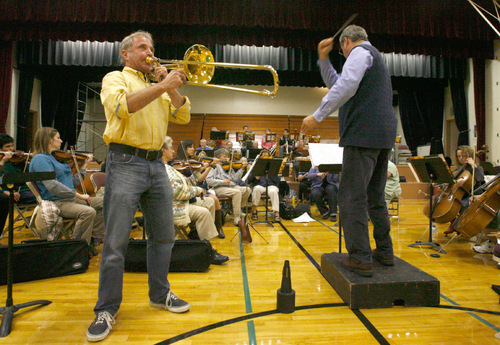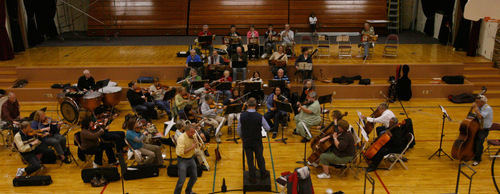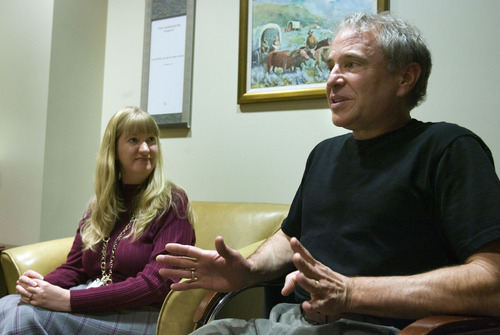This is an archived article that was published on sltrib.com in 2010, and information in the article may be outdated. It is provided only for personal research purposes and may not be reprinted.
Larry Zalkind eats well and exercises regularly but isn't the type to dwell on his health, much less make it the focus of family functions.
But the chance discovery of an unusually large colon polyp propelled him to become keeper of his family's health history.
By night, the 54-year-old father of three plays lead trombone for the Utah Symphony. By day, he's a health sleuth, pestering extended relatives for detailed information about their ailments, which he writes down and shares with his doctor at the Huntsman Cancer Institute in Salt Lake City.
The strategy may seem outdated, considering advances in human genetics.
But talking turkey about diseases lurking in your family tree can trump expensive genetic testing for predicting what illnesses you and your children may inherit, according to research showcased this month by the American Society of Human Genetics.
"It's one of the most proactive and low-cost things you can do for health," said Amanda Gammon, a genetic counselor at Huntsman. "And holiday gatherings are the perfect time to get started."
All it takes is a little time and some nerve, said Zalkind, describing how he once sent a batch of health questionnaires with his mother to a family reunion. "I said, 'Mom, I want you to go to the reunion and talk to everyone about their colons.' "
Still, fewer than 27 percent of Utahns actively keep family health histories, according to the state Department of Health. Scarcer still are good histories.
The state's "family genomics" program sought to change that but closed for lack of funding last year.
"It's not so much about how far you can go back, like with genealogy," said Jenny Johnson, who helped coordinate the five-year program and remains at the health department. "Knowing when someone died and how old they were matters more. Someone who has a heart attack at age 30 is different than someone who had a heart attack at age 80."
It was over Thanksgiving dinner that Johnson started building her own family health portrait. She covered the table with butcher paper and handed out pens.
"It struck me that families actually talk about their medical history without knowing it; 'so-and-so had a heart attack,' or 'I have diabetes and can't eat this,' " she said. "It was easy to steer the conversation toward something more formal."
Online resources are abundant, including government sponsored websites that walk you through the process: http://www.healthfamilytree.utah.edu/ and http://www.familyhistory.hhs.gov.
Vying for people's attention are online genetic screening services that offer DNA analysis direct to consumers. You don't need a doctor's prescription, just a cheek swab and as little as $200.
You may need training in how to interpret them, though. And whether they're a good tool for predicting hereditary disease remains to be seen.
Charis Eng, a cancer geneticist at the Cleveland Clinic's Genomic Medicine Institute, compared mail-order tests against family health pedigrees for measuring the risk for colon, breast and prostate cancer. She shared the results with leaders in the human genetics field at the American Society of Human Genetics (ASHG) 60th annual meeting in Washington, D.C.
Eng mapped family health histories and ordered saliva tests for 44 people: 22 patients of her clinic and their spouses.
Both tools pegged 40 percent as having above-average risk, but not necessarily the same people, she found. For instance, the mail-order screens missed all but one of the eight individuals flagged as high risk for breast cancer by family health portraits.
On the other hand, the screens listed eight men at risk for prostate cancer when their family portraits predicted average- or below-average risk, leading Eng to proclaim family health histories "the gold standard."
It's possible that genetic screens, when combined with family pedigrees, could prove to be a complementary tool, she said in a prepared statement. But, for now, she suggests doctors rely primarily on pedigrees.
Genetic testing is an evolving science, explained Lynn B. Jorde, a geneticist at the University of Utah and president-elect of the ASHG. "It's complicated. We don't know, for example, all of the genes that cause type 2 diabetes. You may have one risk factor but have two protective factors without knowing it because we can't test for them."
The society is mulling a position statement on direct-to-consumer testing, said Jorde, who takes the reins in January. The U.S. Food & Drug Administration also is considering regulating the industry, treating genetic tests as medical tests, like mammography.
The idea faces political opposition and push back from society members who have financial interests in the testing companies.
It's a balancing act, said Jorde, who believes the society has a role in setting standards for responsible use of genetic information.
"Most testing comes with disclaimers for recreational genomics, but they give people back risk information for diseases like Parkinson's, and that's not recreational anymore," he said.
Family health histories aren't fail-proof. But with careful cultivation they form the scaffolding upon which to hang genetic test results and other medical information, said Gammon at Huntsman.
She tells patients to go back at least three generations if possible. Pay attention to cancers and other hereditary diseases such as diabetes, Alzheimer's and multiple sclerosis, she advises. And learn as much about the specifics of those diseases. Was Uncle Bert's diabetes type 1 or type 2? How old was grandma when she was diagnosed and died? Did she die from breast cancer that spread to the lungs, or did cancer start in her lungs? Was she ever genetically tested, and if so, was the exact mutation found? See if you can get a copy of the test results, said Gammon. "And put equal weight on the maternal and paternal sides."
Even with careful pruning of his family tree, Zalkind has yet to shake loose any evidence of familial colon cancer.
His maternal grandmother died at a young age of stomach cancer. "But in those days they called everything in the mid-region stomach cancer," Zalkind said.
Zalkind's foray into family genetics began more than two decades ago when, by chance, doctors found and removed a polyp from his colon. Zalkind was 25, young for such a large growth, so his doctor suggested he build a health pedigree and undergo genetic testing.
Each year, he undergoes a colonoscopy and doctors remove growths, which has kept him cancer free. But his genetic tests came back inconclusive.
"We found a change in the APC gene, which could mean a slight increased risk for colon cancer, but it doesn't explain his development of multiple polyps," explained Gammon.
It's possible the mutation happened in Zalkind, and that research will pay off for future generations, she said. He is among the patients at Huntsman who have consented to load his family history, test results and medical data into the hospital's Hereditary Gastrointestinal Registry.
The registry allows researchers to better understand the interplay of different gene mutations and the role of lifestyle and diet in fending off disease. Eventually, the hospital hopes to combine it with other registries, such as the one it keeps on melanoma, said Gammon.
Zalkind is also encouraging his sons — the youngest is 18 — to be screened early for colon cancer.
"I didn't bring it up with them for a long time," he said. "It seems the wrong approach would have been to alarm them. After all, because I'm watchful, the average person on the street probably has a greater chance of getting colon cancer than I do."
Be a health detective
Jump-start a health history talk at your next family gathering. Compile information about your immediate family beforehand, asking family to fill in the blanks. Write it down and give out copies. Then keep the conversation going:
Add a section on family health history to your family newsletter
Add your family health history to your baby's keepsake book
If you have a new grandchild, niece or nephew, give a copy of your family health history to his or her parents
Turn family health history into a youth project for school or church
Things to ask about
Health problems relatives have had, including allergies
Age at onset or diagnosis
Age and cause of death for family members
Lifestyle habits (smoker/nonsmoker, diet, weight and exercise habits)
Ethnic background
Health problems that run in families
Alzheimer's disease or dementia
Arthritis
Asthma
Birth defects
Cancers (breast, colon, lung, prostate, ovarian and others)
Diabetes
Depression
Heart disease or sudden heart attack
High blood pressure and high cholesterol
Pregnancy losses (stillbirths and miscarriages)
Stroke or blood clots
When to test
Share your health history with your doctor. You may want to talk to a genetic counselor if your family history includes:
Medical problems that occur at an early age
The same health problem in more than one close family member
A health problem that does not usually affect a certain gender, such as breast cancer in men
Certain combinations of health problems within a family, such as breast and ovarian cancer or heart disease and diabetes
Birth defects, growth or development problems and pregnancy concerns.
Helpful sources
Health Family Tree • http://www.health.utah.gov/genomics
U.S. Surgeon General Family History Initiative • http://www.hhs.gov/familyhistory
Centers for Disease Control and Prevention Family History • http://www.cdc.gov/genomics/famhistory/famhist.htm
Genetic Alliance • http://www.geneticalliance.org
National Society of Genetic Counselors • http://www.nsgc.org
Source: Utah Department of Health















